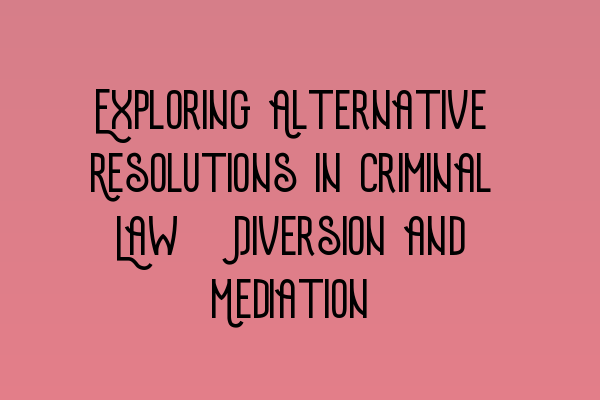Exploring Alternative Resolutions in Criminal Law: Diversion and Mediation
In the field of criminal law, finding alternative resolutions to traditional court proceedings has become an increasingly popular approach. Diversion and mediation offer innovative solutions that not only benefit the parties involved but also alleviate the burden on the judicial system. In this article, we will dive deep into the concepts of diversion and mediation and highlight their significance in criminal law cases.
The Concept of Diversion
Diversion refers to redirecting individuals away from the criminal justice system by providing them with the opportunity to participate in rehabilitative programs. This alternative resolution aims to address the underlying causes of criminal behavior rather than simply impose punishment. By offering counseling, education, and support, diversion programs hope to prevent future criminal activity.
Diversion programs vary depending on the jurisdiction and the nature of the offense. Some common examples include drug rehabilitation programs, community service, restorative justice initiatives, and mental health treatment. These programs not only contribute to the rehabilitation and reintegration of offenders but also reduce the strain on courts, prisons, and other law enforcement resources.
If you want to expand your knowledge and expertise in criminal practice, we recommend attending our Workshops and Seminars on Criminal Practice: Expanding Your Expertise to stay up-to-date with the latest trends and developments in the field.
The Role of Mediation
Mediation, on the other hand, focuses on resolving conflicts between parties through facilitated negotiation and communication. It provides an alternative to adversarial court proceedings, allowing individuals to actively participate in the decision-making process. Mediation is particularly effective in cases involving interpersonal disputes, such as domestic violence, property disputes, or neighborhood conflicts.
During mediation, a neutral third-party mediator assists the parties in reaching a mutually acceptable agreement. The mediator helps clarify concerns, facilitates effective communication, and identifies common ground. The goal is to foster understanding and find a resolution that satisfies the needs and interests of all parties involved.
Staying informed about the updates in UK criminal laws is vital for criminal law practitioners. We recommend reading our article on Updates in UK Criminal Laws: Staying Informed and Prepared to ensure you are well-prepared to navigate the ever-evolving legal landscape.
The Benefits of Alternative Resolutions
Diversion and mediation offer numerous benefits for both individuals involved in criminal cases and the criminal justice system as a whole. These alternative resolutions promote:
- Rehabilitation: Instead of focusing solely on punishment, diversion programs and mediation encourage personal growth, behavior modification, and integration into society.
- Cost-effectiveness: Diverting cases away from court proceedings can significantly reduce the financial burden on the criminal justice system.
- Empowerment: Mediation allows parties to have a say in the outcome, empowering them to actively participate in the resolution process.
- Efficiency: Alternative resolutions often lead to faster and more efficient case resolutions, saving precious time and resources for all parties involved.
To enhance your SQE criminal law study group experience and engage in meaningful discussions on alternative resolutions, we recommend reading our article on Enhancing Your SQE Criminal Law Study Group Experience.
Conclusion
Diversion and mediation offer valuable alternatives to traditional court proceedings in criminal law cases. By focusing on rehabilitation and conflict resolution, these approaches provide a range of benefits for both the individuals involved and the criminal justice system as a whole. Understanding and exploring alternative resolutions in criminal law can expand your expertise and contribute to more effective and compassionate legal practice.
If you are interested in delving deeper into the topic of criminal evidence rules, we invite you to read our comprehensive article on Decoding Criminal Evidence Rules: A Detailed Analysis to broaden your understanding.
For those interested in gaining insight into fraud and financial crimes in the UK, we have prepared an in-depth article that provides a Deep Dive into Fraud and Financial Crimes in the UK. This article will equip you with the knowledge needed to handle such cases effectively.
